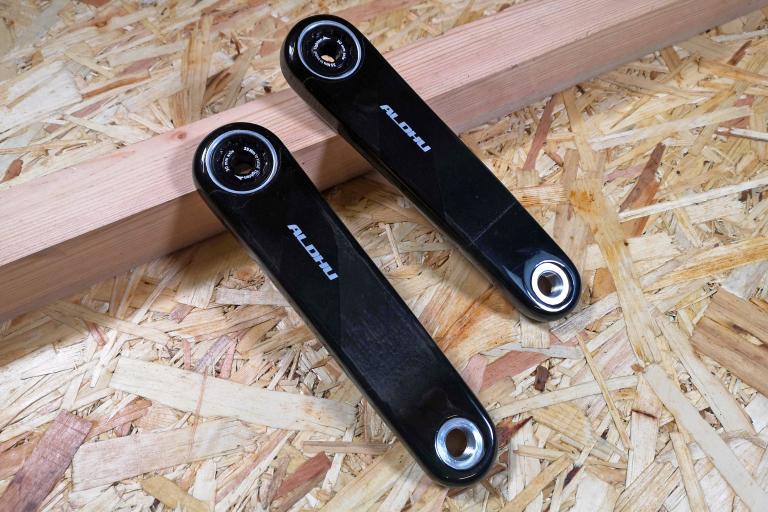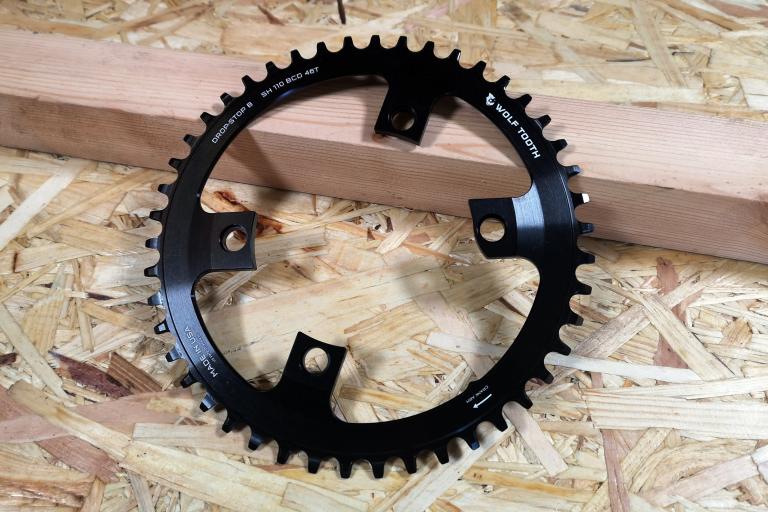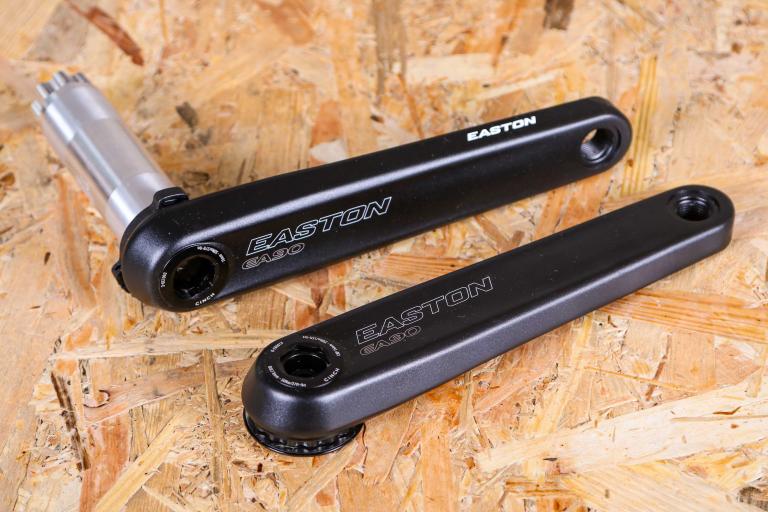- News
- Reviews
- Bikes
- Components
- Bar tape & grips
- Bottom brackets
- Brake & gear cables
- Brake & STI levers
- Brake pads & spares
- Brakes
- Cassettes & freewheels
- Chains
- Chainsets & chainrings
- Derailleurs - front
- Derailleurs - rear
- Forks
- Gear levers & shifters
- Groupsets
- Handlebars & extensions
- Headsets
- Hubs
- Inner tubes
- Pedals
- Quick releases & skewers
- Saddles
- Seatposts
- Stems
- Wheels
- Tyres
- Tubeless valves
- Accessories
- Accessories - misc
- Computer mounts
- Bags
- Bar ends
- Bike bags & cases
- Bottle cages
- Bottles
- Cameras
- Car racks
- Child seats
- Computers
- Glasses
- GPS units
- Helmets
- Lights - front
- Lights - rear
- Lights - sets
- Locks
- Mirrors
- Mudguards
- Racks
- Pumps & CO2 inflators
- Puncture kits
- Reflectives
- Smart watches
- Stands and racks
- Trailers
- Clothing
- Health, fitness and nutrition
- Tools and workshop
- Miscellaneous
- Buyers Guides
- Features
- Forum
- Recommends
- Podcast
review
 Wolftooth Components Elliptical 110 BCD Chainrings.jpg
Wolftooth Components Elliptical 110 BCD Chainrings.jpg£78.95
VERDICT:
Well made and useful size; elliptical rings have benefits in certain conditions but it's not one ring to rule them all
Weight:
75g
Contact:
At road.cc every product is thoroughly tested for as long as it takes to get a proper insight into how well it works. Our reviewers are experienced cyclists that we trust to be objective. While we strive to ensure that opinions expressed are backed up by facts, reviews are by their nature an informed opinion, not a definitive verdict. We don't intentionally try to break anything (except locks) but we do try to look for weak points in any design. The overall score is not just an average of the other scores: it reflects both a product's function and value – with value determined by how a product compares with items of similar spec, quality, and price.
What the road.cc scores meanGood scores are more common than bad, because fortunately good products are more common than bad.
- Exceptional
- Excellent
- Very Good
- Good
- Quite good
- Average
- Not so good
- Poor
- Bad
- Appalling
This elliptical 110-BCD 40T chainring from Wolf Tooth Components (WTC) enables you to create a gearing system option otherwise not available. It's well made, and a variety of sizes, shapes and fitments are available. I'm not totally sold on the oval shape for my needs – a round option is also available – but some will like it.
What with wider tyres, disc brakes, gravel bikes and 1x11-speed transmissions being among the recent trends to take hold, it is an interesting time in cycling with a lot of very capable bikes out there. There is a lot of crossover and mixing and matching going on, with products from the worlds of road and mountain biking that previously were separated by much clearer lines beginning to come together in various forms.
If you are the kind of rider who likes to build your own and experiment, and might have a variety of road, mountain bike and cyclo-cross bike pieces lying around, you may have found yourself just one or two pieces of the puzzle away from building something new and interesting. It's quite often the case with groupsets that manufacturers will make their products as complete systems for a specific purpose, but smaller specialist companies will often come along and see an opportunity to produce a component that allows one system to play with another.
I came across this WTC chainring for exactly that reason, since it is one of a small number of smaller companies offering a huge range of rings in just about any size, shape and fitment you might want, to allow you to find the right solution.
I selected this 40-tooth ring to complete a build that would allow a Shimano XTR rear derailleur on an 11-40 cassette to pair with a Dura-Ace 9000 crankset, along with Shimano's R785 disc brakes and STI levers, to create a 1x11 system for an 'adventure' drop bar bike with a good spread of ratios. This is something not possible with standard XTR or Dura-Ace transmissions, since the single ring mountain bike systems go to a maximum chainring size of 36T, and the road based transmissions do not have a single ring chain-retaining option or a clutch on the rear mech.
> Beginner's guide: understanding gears
I also then fitted it to an Ultegra 6800 crankset in place of the compact 50/34, paired with an 11-28 cassette for use on and off-road with a standard Ultegra Di2 derailleur.
WTC offers this 110mm BCD (bolt circle diameter), asymmetric, 4-bolt ring in round sizes of 36, 38, 40, 42 and 44 teeth, and this elliptical shape in 38, 40 and 42T. All are offset to correct for a single ring chainline and all feature WTC's 'Dropstop' chain-retaining tooth design, which is very similar in form and function to any other type of tooth design using narrow and wide teeth to retain the chain, though seemingly different enough to have its own patent application.
The whole range also includes rings to fit Race Face, S-Works, Cannondale and SRAM direct mount, as well as symmetric 4-bolt rings in 110, 120 and 130mm BCD, and a whole host of mountain bike sizes too.
On the bike, the chainline works very nicely, with smooth pedalling across the extremities of rear ratios and no hook-up on teeth. With the standard Ultegra mech I have not dropped the chain once despite the absence of a clutch, and despite riding that has wandered well into the mountain biking end of gravel at times. Quality of finish is also very good.
Elliptically speaking…
What is left to talk about really then is whether to go elliptical or not. Personally, after this experience I am still somewhat ambivalent on the matter. The general theory behind elliptical rings is fairly simple – our legs are mainly good at pressing pedals downwards, not so quite so good at pulling up on them or pushing them forwards and backwards. What elliptical chainrings do is effectively give the user a smaller diameter ring and hence an easier gear near the positions at 'top dead centre' and 'bottom dead centre positions'. Advocates say this eliminates the dead spots in these parts of the pedal strokes.
WTC produces its elliptical rings with 10% ovality which it says gives the feel of two teeth fewer in the weaker part of the stroke and two teeth more in the stronger part of the stroke. The timing is given as 112 degrees after top dead centre, which means that the ring is producing its biggest gearing effect a little way (22 degrees in fact) after the crank arm is parallel to the ground – or around 3:45 for clock fans. This timing is based on roughly where we tend to be applying the maximum force to the pedals, and the fact that there is often some momentum in the pedal stroke which clocks the whole dead spot effect around a bit.
In reality our legs are a compound system of levers and links, and we as riders are all different shapes and sizes so the oval shape is still something of an approximation. You will often see more complex shapes on pros' time trial machines as they can be matched to the exact torque profile of the rider and their riding position, but that of course is bespoke and very expensive.
Since the shape is a smooth and regular ellipse then the oval effect increases smoothly to a peak before reducing in the same manner to a minimum, and so on, so the actual ramping up and ramping down of the force required on each individual pedal stroke is barely noticeable through the stroke, but the overall effect is felt.
At a lower cadence the benefit of the easier trip through the dead spot is more detectable and the result is a feeling that the gear is a little easier to push than its average size would suggest. When cadence increases, though, power becomes less dependent on the force delivered in each pedal stroke and more dependent on cadence itself and the rate at which you can move the chain. This is going to be governed by the overall number of teeth, as with any other ring, but for a given force the cranks may vary in their speed throughout the stroke, which tends to mess about with your timing. The result is that spinning feels a little awkward while you get used to it and your muscle timing adjusts.
This is part of the source of my ambivalence about oval rings – that one might have to re-adjust a spinning technique that might have been finely honed over many years of cycling. If you've ever ridden a fixed gear at speed down a hill or taken part in goldsprints you can appreciate subtleties of technique and the muscle timing it takes to move your legs in circles at a high rate.
> Read more road.cc reviews of chainsets and chainrings here
The other part of my ambivalence is that the oval shape is presented as a solution to an inherent asymmetry in the function of our legs – but if we make the weaker part of the pedal stroke easier then this is only going to promote the increase as we are loading and hence training our legs more at the point at which they are strongest. It's rather like avoiding hills because you are no good at climbing.
On balance I think an elliptical ring has certain benefits in certain situations, and in that way is like a tool designed to do a specific job – it has its place in the tool box and used correctly can be highly effective, but it doesn't make all other tools redundant.
For me the boon of this offering from WTC is that it provides a compatibility that is otherwise not available, and makes the gear ratios I am looking for possible with some of my favourite transmission components.
Verdict
Well made and useful size; elliptical rings have benefits in certain conditions but it's not one ring to rule them all
road.cc test report
Make and model: Wolf Tooth Components Elliptical 110-BCD Chainring
Size tested: 40T, 110 BCD, 4-bolt
Tell us what the product is for, and who it's aimed at. What do the manufacturers say about it? How does that compare to your own feelings about it?
It's a 40T chainring for 1x gearing systems and sized for CX and gravel bike use.
Wolf Tooth Components says:
"We won't try to convince you that elliptical (or oval, the same thing) chainrings will change your life...but they might! What we can say for sure is that they provide an efficiency benefit and smoother power output. With this, you will experience the benefits of better traction, especially with technical climbing, and faster acceleration.
"Our proprietary design has ovality of 10% and timing of 112° after TDC (top dead center). These values provide the benefits of an oval ring without the drawbacks of greater ovality or more aggressive timing.
The simplest way to explain how they "feel" is that where your pedal stroke is weakest it feels like you have a 2 teeth less on the chainring and where you have the most power it feels like you have 2 more teeth. They feel this way because with the radius of the chainring constantly changing, the torque needed to turn the cranks is constantly changing to better match your power output. Example: a 38t chainring feels like a 36t in the weak part of your pedal stroke and a 40t in the part of the stroke where your legs have the most power.
"If you plan to ride in very muddy conditions, we recommend a chainguide or chainkeeper in addition to a clutch-type rear derailleur! Without these precautions, you may experience chaindrops and/or chainsuck."
Tell us some more about the technical aspects of the product?
Elliptical shape with 110mm BCD 4-bolt assymetric mounting pattern and "Dropstop" chain retention. The shape has an ovality of 10% and timing of 112 degrees.
Rate the product for quality of construction:
9/10
Very nicely finished.
Rate the product for performance:
8/10
No chainline issues and well formed shape for quiet and smooth pedalling.
Rate the product for durability:
8/10
As durable as expected, has been given plenty of use but plenty of life still left and no reason to think it won't last around as long as most other chainrings in the fairly well used 7075 T6 material.
Rate the product for weight (if applicable)
5/10
Weight is as expected for this type and size of chainring, it's not excessively engineered for weight reduction but it is light and plenty stiff enough.
Rate the product for value:
7/10
Not the cheapest but it is not a commonly used size and the range of sizes available mean that Wolf Tooth is a rather specialist manufacturer with a price tag to suit.
Tell us how the product performed overall when used for its designed purpose
It allowed a gearing system option that otherwise was not available, but I'm not totally sold on the oval shape for my needs.
Tell us what you particularly liked about the product
Well finished, quiet and never dropped the chain.
Tell us what you particularly disliked about the product
I found the oval shape a little awkward at first and it frequently felt like I couldn't find the right gear, though I did get used to it and enjoyed its benefits also.
Did you enjoy using the product? Not at first, but in the end yes, mostly.
Would you consider buying the product? Yes, but I would likely get the round one.
Would you recommend the product to a friend? If I thought it would suit their riding style, yes.
Use this box to explain your score
Well made and very useful sizing to allow a gearing system option otherwise not available. I'm not totally sold on the oval shape for my needs but some will like it. A round option is also available.
About the tester
Age: 0
I usually ride: My best bike is:
I've been riding for: I ride: I would class myself as:
I regularly do the following types of riding:
Latest Comments
- Martin1857 8 min 45 sec ago
As a member of the Co-op community (I live in a Housing Co-op) and a bike owner /rider, this is very sad news. We need more Co-ops not less.
- AnotherChrisOnAnotherTrike 9 min 36 sec ago
My EV exceeds the size. It's the smallest vehicle available which can transport my wife's trike (excursions or rescue).
- Dnnnnnn 0 sec ago
It is sad for the individuals concerned but (and this is a general point, rather than specific to this story), we're much better off overall for...
- No Reply 50 min 35 sec ago
I agree with Pogacar regarding social media. The likes of Facebook, Instagram have done untold damage, especially to the minds of young people....
- David9694 55 min 25 sec ago
Lorry carrying 25 tonnes of beer catches fire on the M11...
- No Reply 59 min 57 sec ago
If you're a cyclist on a road you are public enemy number 1.
- Rendel Harris 1 hour 29 min ago
He advocates only riding mountainbikes solely offroad for ultimate safety, which is great if you're a millionaire of leisure living in Colorado...
- ktache 2 hours 23 sec ago
That looks like a fun bike. Frame only, 2 and an 1/2 grand.
- wtjs 2 hours 56 min ago
Fair enough, personal experience may trump (not that one) theory. However, the bonking I have experienced has been due to lack of carbs. Your point...
- Rendel Harris 4 hours 24 min ago
mdavidfrodo?




Add new comment
3 comments
is it better than absoluteblack oval rings? seem to be a few suppliers of these type of ring these days. I like the various colours and price of the absolute ones...
Worth looking around, WolfTooth have a couple of distributors in the UK, e.g.
https://cycleworx.co.uk/collections/wolf-tooth
http://www.leveret.cc/
..and a few places do random Linderats/WolfTooth stuff like Goat/Roadlink (Sigma Sports comes to mind).
I have oval chainrings on my CX & MTB bikes & they're ace. I'd reckon they're worth maybe 1/2 a gear in terms of reduced effort on rough surfaces where the pedalling action is irregular. However I don't think there's much advantage on the road, riding a steady cadence.
Wolf Tooth kit is beautifully made, but beware! - delivery comes direct from the US & there may be extra costs. One recent order for 2 items came to $119.90, about £99, a bit over the odds but good value IMHO given the quality. However I was caught for £2.97 extra on the card for FX commission, £19.53 VAT to HM Customs & £8 "handling charge" to Royal Mail (& there's me thinking the cost of handling items of mail might be covered by the postage costs!), £130 in all, making the parts rather expensive in practice. I'll carry on buying Wolf Tooth coz it really is worth it, but all the same...